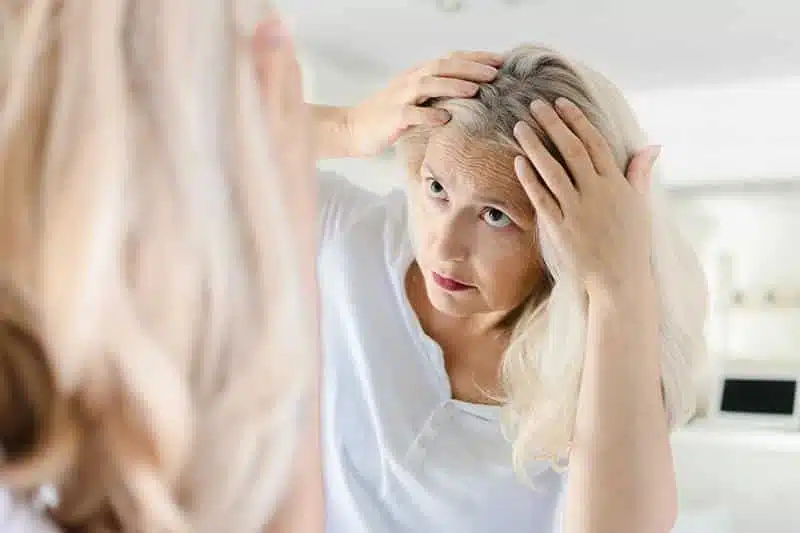The period of menopause marks the end of a woman’s reproductive age and is defined as the one that begins one year after the end of menstruation.
The period of menopause marks the end of a woman’s reproductive age and is defined as the one that begins one year after the end of menstruation.
This period in several cases brings with it a lot of new data. Among them is the thinning of the hair, which can be accompanied by possible hair loss Although hair loss during menopause is directly linked to the change in hormone levels during the above period, a factor which is clearly to blame for most cases of hair loss.
One should not overlook other causes which to a greater or lesser extent can be held responsible for some of the cases of hair loss.
Hair loss is not one of the first symptoms of menopause that most women would think of as it is a period that has been most associated with hot flashes, mood swings and weight gain.
Like all of the above, the weakening of the hair, along with possible hair loss, comes as a result of the hormonal changes that take place in the female body during menopause and is found in a percentage close to 40%.
The main hormonal change lies in the reduction of estrogen levels, which is also the main cause of hair loss as it affects the hair growth cycle.
More comparatively, estrogen helps to keep the hair in the growth phase for longer.
Their reduction results in the above phase of the cycle becoming shorter.
While during menopause estrogen decreases, there is an increase in androgen levels.
This change does not necessarily lead to hair loss, however, it contributes to the thinning of the hair, which often results in a significant reduction in hair volume.
The above hormonal changes can lead to hair thinning or hair loss depending on the genetic predisposition of each individual.
-
Other factors can contribute to less or more hair loss during menopause, which are related – sometimes more and sometimes less – to the health of the hair and which should be taken into account before any treatment is attempted.
Such factors are stress, eating habits with negative effects on the hair, hormonal disorders, such as those of the thyroid gland
Hormone replacement therapy consists of returning estrogen levels close to pre-menopausal levels resulting in the relief of unpleasant menopausal symptoms and the prevention of osteoporosis.
In many cases, hormone replacement therapy can help deal with the unpleasant consequences of declining estrogen for hair.
However, one should take into account that in such a case not all treatments are suitable as in some cases the condition may worsen.
Therefore, it is considered necessary if one is experiencing a hair loss problem, to include it in their history when discussing with the doctor.
Hair loss, especially in the early stages, is reversible.
It is therefore very important if you notice more hair loss than normal levels to contact a specialist doctor in order to understand the reasons for the hair loss and to control the situation.
At the treatment level you should have patience as hair restoration is a process that requires time.
The treatments available today consist of reducing the rate of hair loss and covering the problem areas, while the choice of the one considered appropriate depends on the cause and extent of the problem as well as the response of the patient herself.



